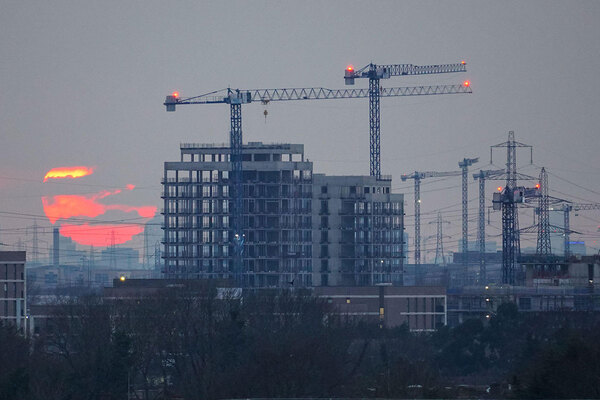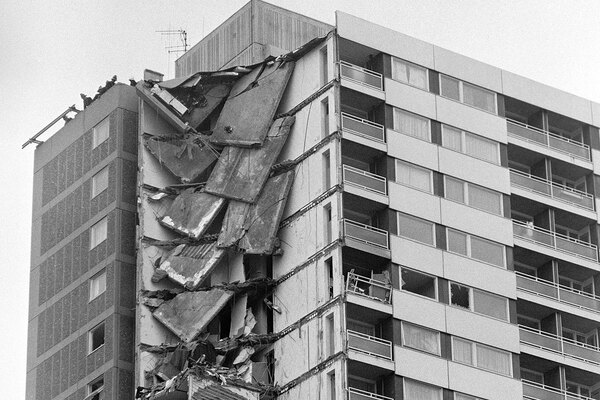Grenfell cladding firm president accepts staff ‘lied’ and ‘misled’ customers about fire performance
The president of the French firm which sold the cladding panels used on Grenfell Tower has accepted that its staff “misled” and “lied” to customers, as he was grilled about a series of internal emails which showed it hiding serious test failures from the market.
Claude Schmidt, president of AAP SAS, the French-arm of American multinational company Arconic, was today asked to account for emails which acknowledged that the firm was “not clean” and said failed fire tests on the cladding product used on Grenfell Tower must be kept “VERY CONFIDENTIAL”.
The inquiry has already heard that testing from 2005 showed the panels obtained a reasonably high ‘Euroclass B’ rating when fixed to a wall with rivets, but burned 10 times as fiercely and failed “spectacularly” when bent into ‘cassette’ shapes and hung from the wall on rails.
This result was confirmed in 2011, when repeats on the cassette system – as used on Grenfell Tower – saw it first obtain an ‘F’ and then an ‘E’ grade.
But the firm disclosed none of this testing to the market or to product certifiers. The inquiry heard claims earlier this week that it had dismissed the 2005 test as merely a “rogue result”.
In the first of a series of damning internal emails, Mr Schmidt was shown a March 2010 message from Isabel Moyses, one of the firm’s European salespeople, which said a Spanish competitor had moved to only offering more fire-retardant panels as they could not obtain the Euroclass B required in the country. She noted that if Arconic did the same, “our prices are no longer in line with market trends”.
Claude Wehrle, technical manager at Arconic, then responded that its product, Reynobond, “in cassette form doesn’t obtain level B either”.
“Having said that, this shortfall in relation to this standard is something we have to keep as VERY CONFIDENTIAL!!” he added.
Mr Schmidt accepted that this showed Mr Wehrle did not believe the failed test was a “rogue result” and in fact he understood that it represented the true fire performance of the product.
“Do you accept that Arconic through Mr Wehrle knew that architects, designers and construction professionals were being misled by the claimed fire classification for the cassette variant?” asked Richard Millett QC, counsel to the inquiry.
“Yes,” replied Mr Schmidt.
Mr Schmidt’s line manager, sales and marketing director Guy Scheidecker, then replied to Mr Wehrle’s email saying: “This shouldn’t even have been mentioned.”
Mr Schmidt said he was not told of this by Mr Scheidecker and was not able to explain how it was happening “on his watch” as president.
Further emails from July 2010 then showed a Portugese company asking Ms Moyses for the fire classification specifically for a cassette system. At first she resisted providing it, before forwarding the email to Mr Wehrle.
“Isa,” he replied. “It’s hard to make a note about this… Because we’re not ‘clean’.”
He then sent the client a letter, dated 5 July 2010, which claimed that the riveted system represented the “worst case” and said the cassette would perform better because the flammable core is “protected”.
This was a total contradiction of the testing information Arconic had available. “Do you accept that in telling [the client] rivet was worse than cassette in terms of fire performance, Mr Wehrle lied to him?” asked Mr Millett.
“Yes,” replied Mr Schmidt. Mr Wehrle is among the Arconic witnesses refusing to give evidence.
Mr Schmidt was then shown emails which showed the Reynobond panels were retested in 2011, with the riveted system once more obtaining a B grade.
But the cassette variant failed so seriously that the test was stopped before the end, meaning it was classified as F without even being given a formal report.
“Oops,” wrote Mr Wehrle in an email sent to two colleagues. “The classification of PE in cassettes following the test this morning is ‘F’ !!!”
Mr Schmidt denied that Mr Wehrle’s language showed that he was “making light” of the issue. “If there was any shred or small piece of a view remaining in Arconic that the [test on cassettes] from 2005 was a ‘rogue’ then this 2011 test dispelled that?” asked Mr Millett.
“Yes,” replied Mr Schmidt. Following a further test in October 2011, the panel was given an E grade.
The inquiry then showed Mr Schmidt minutes of a meeting between Mr Wehrle and the representative of a competitor, 3A, which made Alucobond-branded panels.
The minutes of this meeting noted that the “evolution of fire regulation will put PE out of the market in the coming month[s]”. But they added: “For the moment, even if we know that PE material in cassette has a bad behaviour exposed to fire, we can still work with national regulations who are not as restrictive.”
Asked if this was the strategy Arconic pursued following this meeting, Mr Schmidt said the firm continued to “respond to the needs of the clients”.
Further emails show that in June 2012, Mr Schmidt was invited to a meeting with Mr Wehrle to discuss the “serious issue” of the fire classification of Reynobond PE. “We would like to hear your opinion on the position to be held on the market,” he wrote. Mr Schmidt declined the meeting.
Asked why, he explained that he was “overloaded with work”. According to Mr Wehrle’s witness statement, the pair had a “brief discussion” and agreed to remove the Euroclass B rating from its marketing material.
Mr Schmidt said he could not remember if this discussion took place, however documents show that the Euroclass B rating disappeared from Arconic’s 2012 brochure, having been present in 2010. But nothing was added about the Class E grade which it had now achieved.
“Do you accept that it was a dangerous practice to leave it to the customer to find out that the cassette variant of the product had a Class E rather than volunteer to tell them?” asked Mr Millett.
“It was risky,” said Mr Schmidt.
In the UK, a Euroclass B rating was one of two classifications which could permit a cladding panel to be used on a building taller than 18m.
The other was the national rating of ‘Class 0’ which was easier to obtain. A previous Reynobond PE brand had a test securing this rating, but the one made in France was never tested to this standard.
However, a certificate from respected third-party certifier, the British Board of Agrément (BBA), suggested it met both Class 0 and Euroclass B. The BBA was never given the reports of the failed tests.
Mr Schmidt will continue giving evidence on Monday.
Sign up for our weekly Grenfell Inquiry newsletter
Each week we send out a newsletter rounding up the key news from the Grenfell Inquiry, along with the headlines from the week
Already have an account? Click here to manage your newsletters













